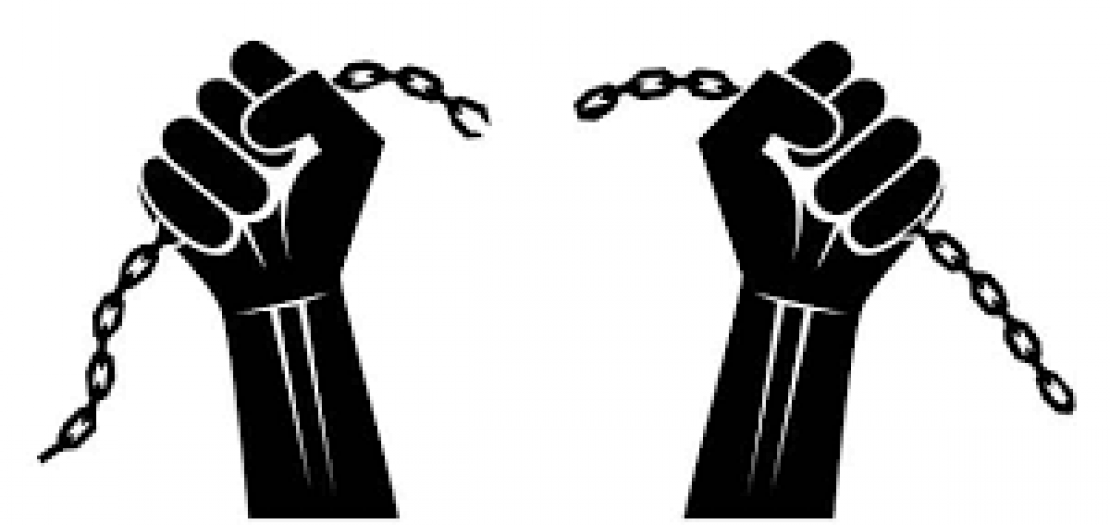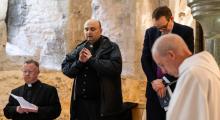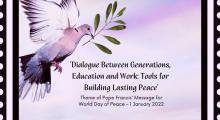Issued by the Catholic Center for Studies and Media - Jordan. Editor-in-chief Fr. Rif'at Bader - موقع أبونا abouna.org

For the first time ever, a large scale research project has been conducted to find out the extent of involvement in anti-trafficking work by Catholic religious congregations in England and Wales.
The study, by the Arise Foundation, has revealed that 172 members of Religious Institutes - 144 women and 28 men - are providing frontline services to people who have fallen prey to traffickers. A report based on the survey's findings was launched at a special reception this evening (Monday 12th November) in central London, hosted by ITN Presenter Julie Etchingham.
In addition to offering personnel, 16 Religious Congregations have provided 29 properties at a book price of nearly 16.4 million pounds. But this is the book rather than market value, so is highly likely to be an underestimate of the value of these buildings. Some of these properties are used as safe houses where victims of modern slavery, including women with children, can find refuge and start to rebuild their lives.
CoREW members have donated more than £10 million pounds to anti-trafficking in the last five years.
A hidden aspect of the involvement of Religious in anti-trafficking is when they accompany police during rescue operations. The survey has discovered that a total of 23 Congregations work with the Police and NGOs. They also assist in managing referrals from the police, joint outreach and providing training. Notably, one Congregation donated a property for a local police constabulary where victims of trafficking could be interviewed in a less formal environment and provided with safe accommodation.
A question was also asked about length of service - the amount of time people have been doing this for. Adding the cumulative total, it's possible to quantify it as 643 years of combined antislavery service with a couple of people having spent nearly a quarter of a century in the struggle.
And it's all predominantly voluntary work, in line with their vocation. 144 Religious receive no financial remuneration for their ministries; only nine members hold paid roles.
A total of 22 religious have been involved in founding antislavery organisations. They represent the full range of antislavery service provision: from prevention work to rescue, shelter and on-going accompaniment.
The research shows that Religious Congregations have not allowed their changing demographic to prevent them from contributing in important ways to the antislavery movement. The Conference of Religious of England and Wales, which is an umbrella organisation for over 250 Religious Institutes of men and women, has announced that it will now set up a UK Network of Religious involved in anti-trafficking work, to provide a platform for enhanced collaboration. It will be affiliated to similar international groupings.
Thanking Arise for the research, CoR Vice-President, Sr Jane Maltby RSCJ, said: "Speaking from a personal perspective, my Congregation owns a property that we no longer need, and, rather than sell this commercially, we undertook extensive research and consultation in order to make the best decision we could, that would be in line with our priorities for mission.
"In the past, we ran schools and projects around the welfare of women and children, with others collaborating with us. Today, we are delighted to be able to turn that around, and we collaborate with others. In gifting the property and enabling women and children survivors to be cared for in a safe environment, we have entered a partnership which expresses the gospel values of tenderness and mercy, so much a part of our charism, or special spiritual character. The property currently houses 26 women and ten children and babies, a result that touches us deeply.
"It cannot be ignored that the contribution outlined in this report is overwhelmingly female. This may reflect the fact that, until recently, the issue was framed almost in terms of human trafficking, which for many reasons has been understood as a problem predominantly affecting women.
"Finally, going beyond numbers and statistics, it is abundantly evident from the different categories of giving: in terms of human resources, property and money, that the commitment of religious is long-term, is inspired by traditions of service to those in need, and is an integral part of their spirituality. There is an important section in the report which I recommend that you read which speaks about the intangible aspects of anti-slavery accompaniment. Aspects like love and trust which are so critical to this work, and yet feature so rarely in policy conversations on this subject. Love and trust takes time to build and to make manifest. It is the core strength of the work of religious in this area."
The Director of Arise Foundation, Luke de Pulford added: "Women religious are the un-sung heroines of the anti slavery movement. They are active in the worst-affected parts of the world - preventing, rescuing, and offering accompaniment over decades. But they are also active in countries of destination like the UK where they continue to make a huge contribution, giving their houses to be used as shelters, and so much more. Arise is privileged to have produced this research, documenting the scale of the contribution of religious in England and Wales.
"We are conscious that these numbers do not do justice to the special character of the work of religious, which is less about numbers and more about the quality of long-term, loving commitment to those on the margins. Their voice is sorely needed in this movement, and I hope this report enables them to be heard."







